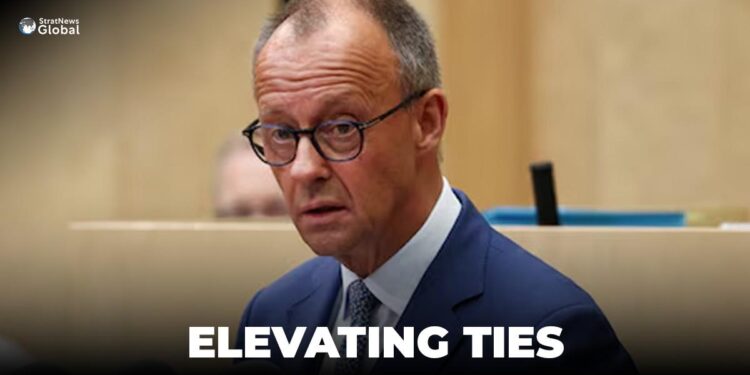Germany’s political landscape takes a notable turn as Friedrich Merz, leader of the Christian Democratic Union (CDU), hails a ‘new chapter’ in German-UK relations. Amid evolving geopolitical dynamics and post-Brexit challenges, Merz’s remarks signal a renewed commitment to strengthening ties between Berlin and London. This development comes at a crucial time as both nations seek to redefine their partnership in trade, security, and diplomacy. In this article, we explore the implications of Merz’s statements and what they mean for the future of German-UK cooperation.
Germany UK relations enter new phase with Merz’s strategic vision
Germany’s commitment to revitalizing ties with the United Kingdom has taken a decisive turn under Chancellor Friedrich Merz’s leadership. His strategic vision emphasizes deepening economic partnerships, enhancing security collaborations, and fostering innovation-driven exchanges. Focused on overcoming post-Brexit uncertainties, Merz advocates for a pragmatic approach that balances sovereignty concerns with mutual benefits. Key areas of cooperation highlighted include:
- Trade liberalization and investment incentives
- Joint ventures in green technology and digital infrastructure
- Security and intelligence sharing to combat international threats
- Cultural and educational exchange programs to strengthen people-to-people ties
Experts note that this renewed agenda not only aims to restore pre-Brexit momentum but also to position Germany and the UK as pivotal partners within Europe and globally. The table below outlines the primary sectors targeted for collaboration under the new framework:
| Sector | Key Initiatives | Expected Outcomes |
|---|---|---|
| Economy | Trade agreements & joint startups | Increased FDI & market access |
| Technology | Green energy projects | Carbon-neutral growth |
| Security | Intelligence cooperation | Enhanced threat response |
| Culture & Education | Exchange programs | Stronger bilateral understanding |
Economic partnership opportunities emphasized in Germany UK collaboration
In recent discussions between Germany and the United Kingdom, officials highlighted significant economic partnership opportunities poised to strengthen bilateral ties. Emphasizing sectors such as technology, renewable energy, and manufacturing, both nations expressed a shared commitment to fostering innovation and trade expansion. The collaboration aims not only to enhance market access but also to streamline regulatory frameworks, creating a fertile ground for increased investment and cross-border business ventures.
Key areas of focus include:
- Joint research and development projects in green technology
- Enhanced trade facilitation and customs cooperation
- Support for small and medium-sized enterprises (SMEs) in both markets
- Digital infrastructure and cybersecurity collaboration
| Sector | Germany’s Strength | UK’s Advantage |
|---|---|---|
| Renewable Energy | Advanced wind turbine tech | Expanding offshore projects |
| Manufacturing | Precision engineering | Robust supply chains |
| Digital Economy | AI research hubs | Fintech innovation |
Policy recommendations for strengthening bilateral ties and trade connectivity
To cement this “new chapter” in German-UK relations, policymakers must prioritize streamlined customs procedures and regulatory alignment that go beyond existing frameworks. Encouraging mutual recognition of standards-particularly in emerging sectors such as green technologies and digital services-would significantly reduce trade frictions and foster innovation-driven cooperation. Furthermore, enhancing infrastructure connectivity through joint investments in transport corridors and digital networks will strengthen supply chains and facilitate smoother cross-border transactions.
Key strategic moves should include:
- Establishing bilateral digital trade agreements to promote data flow and cybersecurity collaboration.
- Expanding joint research programs focused on sustainability and industrial transformation.
- Harmonizing visa and labor policies to enable workforce mobility, crucial for sectors facing skill shortages.
- Instituting regular high-level economic dialogues to swiftly address trade uncertainties and unlock new market opportunities.
| Policy Area | Action | Expected Outcome |
|---|---|---|
| Customs & Standards | Mutual recognition agreements | Reduced border delays |
| Transport & Infrastructure | Joint corridor investments | Enhanced trade flow |
| Digital Trade | Data sharing frameworks | Boosted e-commerce |
| Labor Market | Visa facilitation | Addressing skill gaps |
In Conclusion
As Germany and the United Kingdom embark on this renewed phase of cooperation, Chancellor Merkel’s successor Friedrich Merz’s remarks underscore a shared commitment to strengthening bilateral ties amidst a shifting European landscape. The developments signal a pragmatic approach to collaboration beyond Brexit, setting the stage for enhanced economic, political, and cultural exchanges in the years ahead. Observers will be watching closely to see how this “new chapter” unfolds and impacts broader regional dynamics.















